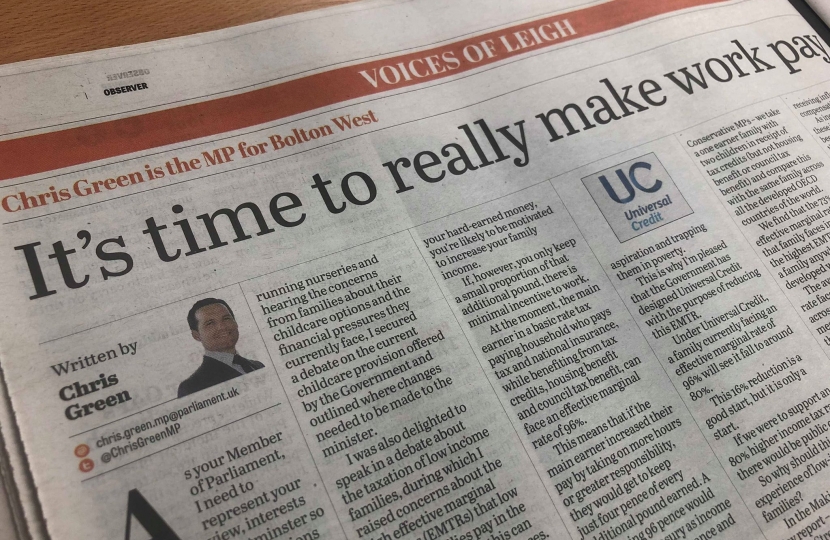
As your Member of Parliament, I need to represent your view, interests and values in Westminster so that Government decisions best reflect our local interest. When I’m out canvassing, hosting or attending public meetings or running my regular advice surgeries, I speak to many constituents from a wide variety of backgrounds which keeps me informed. MPs also receive hand written letters, a wealth of emails and communications via social media.
After meeting people running local nurseries and hearing the concerns from local families about their childcare options and the financial pressures they currently face, I secured a debate on the current childcare provision offered by the government and outlined where changes needed to be made to the minister. I was also delighted to speak in a debate about the taxation of low income families, during which I raised concerns about the high effective marginal tax rates (EMTRs) that low income families pay in the UK and the strain this can place on a family’s finances.
EMTRs reflect the amount of money that goes to the Exchequer from every additional pound earned over one’s current salary - a key measure of encouraging people to increase their responsibility or hours in work. If you get to keep most of your hard-earned money, you’re likely to be motivated to increase your family income. If, however, you only keep a small proportion of that additional pound, there is minimal incentive to work.
At the moment, the main earner in a basic rate tax paying household who pays tax and national insurance, while benefiting from tax credits, housing benefit and council tax benefit, can face an effective marginal rate of 96%. This means that if the main earner increased their pay by taking on more hours or greater responsibility, they would get to keep just 4 pence of every additional pound earned. A staggering 96 pence would go to the Treasury as income tax, national insurance and lost benefits. Under this arrangement, working families across the UK and in my constituency are being robbed of aspiration and trapping them in poverty.
This is why I’m pleased that the Government has designed Universal Credit with the purpose of reducing this EMTR. Under Universal Credit, a family currently facing an effective marginal rate of 96% will see it fall to around 80%. This 16% reduction is a good start, but it is only a start. If we were to support an 80% higher income tax rate, there would be public outcry. So why should this be the experience of low-income-families?
In the Making Work Pay report - conducted by the Strengthening Families Manifesto group of Conservative MPs - we take a one earner family with two children in receipt of tax credits (but not housing benefit or council tax benefit) and compare this with the same family across all the developed OECD countries of the world. We find that the 73% effective marginal rate which that family faces in the UK is the highest EMTR on such a family anywhere in the developed world! The average marginal rate faced by such a family across the OECD is just 33% meaning that they get to keep the equivalent of 67 pence in the pound.
How did this happen? It’s because from 2000 onwards our tax system ceased to recognise family responsibility with the demise of additional persons and married couples allowances. In-work low income families have since paid a significant amount of tax, receiving inflated benefits as compensation. As income has risen, and these inflated benefits have been withdrawn, on top of the ongoing tax and national insurance liability, our confiscatory EMTRs have appeared.
If we are to bring our EMTRs into line with the OECD average, we should reduce the Universal Credit taper rate. However, I believe the single most helpful change, would be to provide families with the option of joint taxation as in other developed countries. This would ensure that families across my constituency and the country keep more of the money that they earn and be free to make their own spending choices, rather than being heavily taxed and having only some of their hard-earned money returned to them in the form of benefits.


